

Classroom connection: 'Plandemic' brings conspiracy theory mainstream — News Literacy Project. The 26-minute video Plandemic which pushed an array of dangerous and provably false conspiracy theories and other misinformation about the COVID-19 pandemic ignited fringe communities last week and went massively viral before major social media companies took steps to remove it from their platforms.
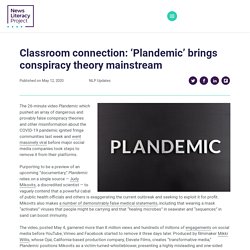
Purporting to be a preview of an upcoming “documentary,” Plandemic relies on a single source — Judy Mikovits, a discredited scientist — to vaguely contend that a powerful cabal of public health officials and others is exaggerating the current outbreak and seeking to exploit it for profit. Mikovits also makes a number of demonstrably false medical statements, including that wearing a mask “activates” viruses that people might be carrying and that “healing microbes” in seawater and “sequences” in sand can boost immunity. Falsifield details Related Discuss: What made Plandemic spread so widely so quickly? 10 tips for smarter, more efficient Internet searching.
These days, everyone is expected to be up to speed on Internet search techniques.
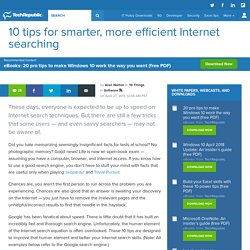
But there are still a few tricks that some users — and even savvy searchers — may not be aware of. Did you hate memorizing seemingly insignificant facts for tests at school? No photographic memory? Good news! Life is now an open-book exam — assuming you have a computer, browser, and Internet access. Chances are, you aren't the first person to run across the problem you are experiencing. Google has been fanatical about speed. This article is also available as a PDF download. 1: Use unique, specific terms. 6 key strategies for finding reliable information online. Research tells us that recent college graduates lack the skills needed to find the best answers to solve problems in the workplace.
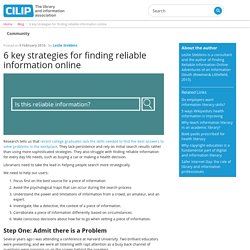
They lack persistence and rely on initial search results rather than using more sophisticated strategies. They also struggle with finding reliable information for every day life needs, such as buying a car or making a health decision. Librarians need to take the lead in helping people search more strategically. Filtering information quickly. Choosing good keywords. Make Your Web Searches Better With These Tips. Ever been frustrated with your web search results?
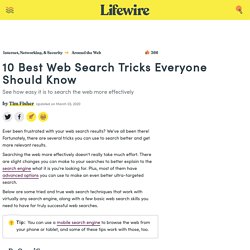
We've all been there! Fortunately, there are several tricks you can use to search better and get more relevant results. Searching the web more effectively doesn't really take much effort. Digital forensic tool list. Source Checker - ABC Education. Eyewitnesses These are people who were there and saw something, or are directly affected in some way — e.g. victims or bystanders in a crime or disaster.
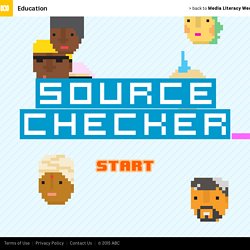
Expert Opinions These are people who have credible expertise in the area being reported on — e.g. academics, scientists or certified practitioners. Official Statements These can be issued by government or public services or private individuals and companies, and represent an 'on the record' response to an event covered by the media. e.g. Reports and Statistics. These are published findings by an institute or research group, or by corporate organisations — e.g. the Australian Census, an independent report on the impact of gaming, or shoe sales figures. Why This Book? – Web Literacy for Student Fact-Checkers. The web is a unique terrain, substantially different from print materials.
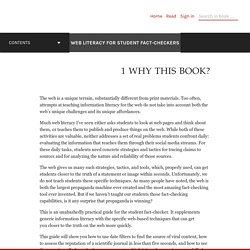
Too often, attempts at teaching information literacy for the web do not take into account both the web’s unique challenges and its unique affordances. The EdTech Show. 13 Tips for Teaching News and Information Literacy. Developing Searching, Skimming, and Scanning Skills With Internet Bingo. Home › Classroom Resources › Lesson Plans Lesson Plan Student Objectives Session 1.
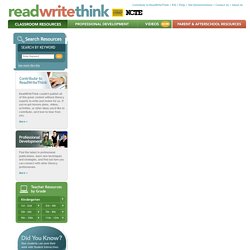
Designing an interactive virtual learning environment with a learner centered approach. Basic Search Education Lesson Plans - GoogleWebSearchEducation. Web search can be a remarkable research tool for students - and we've heard from educators that they could use some help to teach better search skills in their classroom.
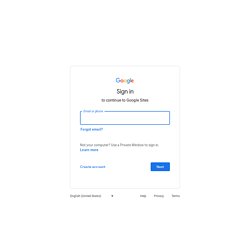
The following Search Education lessons were developed by Google Certified Teachers and the Search Education team to help you do just that. The lessons are short, modular and not specific to any discipline so you can mix and match to what best fits the needs of your classroom. Additionally, all lessons come with a companion set of slides (and some with additional resources) to help you guide your in-class discussions. They are all under Creative Commons Attribution Share-alike, so feel free to adapt them and use them as you see fit!
Just please link back to this page. Understanding the fundamentals of how search engines work will help your students become better searchers. What is the Web? New versions of Research Smarter resource sheets now available! – Information Literacy Website. The CILIP Information Literacy Group (ILG) has issued new versions of its Research Smarter resource sheets, which are designed to help secondary school students research effectively and be information literate.
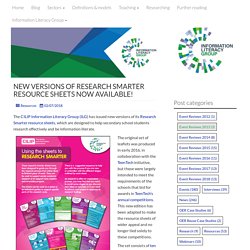
The original set of leaflets was produced in early 2016, in collaboration with the TeenTech initiative, but these were largely intended to meet the requirements of the schools that bid for awards in TeenTech’s annual competitions. This new edition has been adapted to make the resource sheets of wider appeal and no longer tied solely to these competitions. The set consists of ten resource sheets, nine of which are each focused on a different aspect of the research process, and on how the effective and discerning use of information forms a crucial part of that process.
Student-Made E-Books: A Beautiful Way to Demonstrate Learning. Search like a Ninja. Introduction to Crash Course Navigating Digital Information #1. Award-winning Family Games. 50 Mini Lessons For Teaching Students Research Skills Kathleen Morris 1qxevz5.